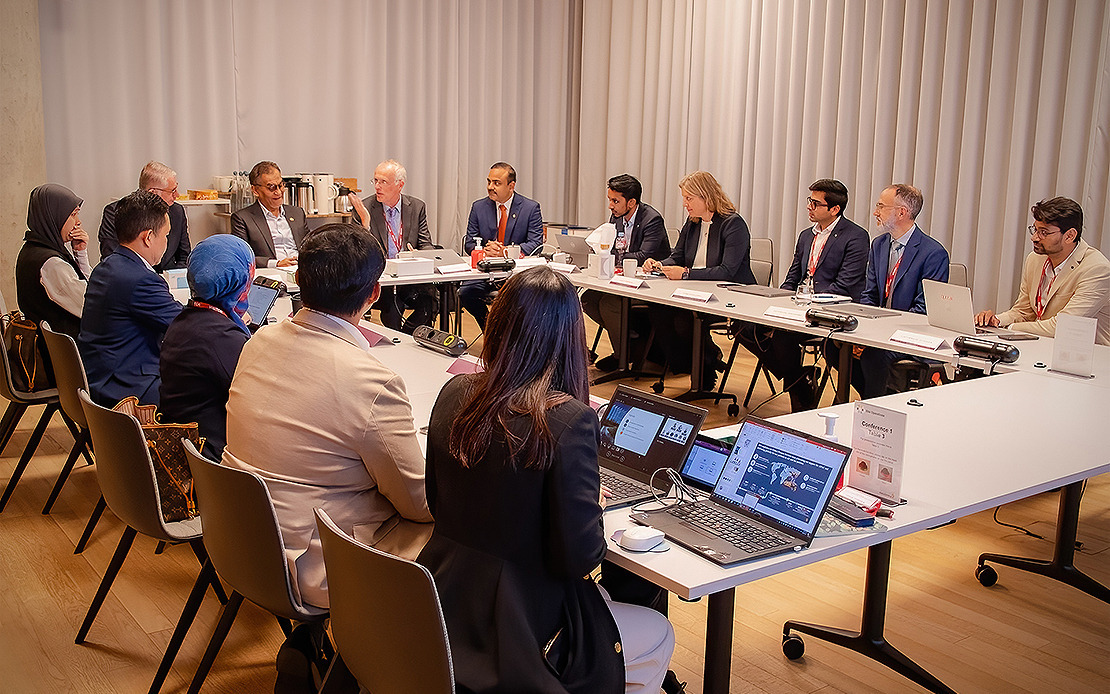AstraZeneca, MoH Forge Path For Advanced Healthcare Solutions

KUALA LUMPUR, Sept 30 (Bernama) -- In a bid to enhance Malaysia’s healthcare capabilities through collaborative knowledge sharing, the Ministry of Health (MoH) recently visited AstraZeneca's research and development facility, the Discovery Centre (The DISC), located within the Cambridge Biomedical Campus in the United Kingdom.
This strategic location places AstraZeneca’s laboratories in close proximity to leading hospitals, the University of Cambridge, various research institutions, and multiple biotech companies, fostering a culture of open partnership and innovation.
In a statement, AstraZeneca said the RM5.5 billion research and development facility is equipped with cutting-edge robotics, high-throughput screening, and AI-driven technology.
“The DISC aligns with AstraZeneca’s focus on specialised and precision medicines, and it serves as a hub for the discovery and development of next-generation therapeutics, including nucleotide-based, gene-editing, and cell therapies,” the statement read.
Health Minister Datuk Seri Dr Dzulkefly Ahmad was quoted as saying in the statement that as Malaysia ages, healthcare offerings need to move quicker to ensure that the people stay healthy and get the support they need as and when needed.
“We are impressed by the technological innovations that AstraZeneca is embarking on here at The DISC. We believe that public-private partnerships as part of a whole-of-nation approach, not just with the MoH but with other ministries too, can address this need,” he said.

Malaysian Health Minister Datuk Seri Dr Dzulkefly Ahmad (centre) alongside AstraZeneca key representatives at the pharmaceutical's research and development facility, the Discovery Centre (The DISC) in the United Kingdom. Credit: KKM
AstraZeneca’s Head of Commercial IT and Digital, International and Japan Nick Passey said innovation in digital health holds tremendous potential to benefit health systems.
“We’ve seen from our collaborations across the life science industry both in the UK and globally, the potential of these solutions to address healthcare challenges and equitably and at scale,” he said.
AstraZeneca Malaysia Country President Vinod Narayanan stated that AstraZeneca Malaysia remains dedicated to collaborating with the MoH and other relevant government entities to ensure timely and effective care for the people of Malaysia.
“Our focus on leveraging technological innovations reaffirms our continuous support for the nation's healthcare goals,” he noted.
The statement added that the MoH’s visit to The DISC represents another significant stride in cementing the ongoing partnership and pursuing impactful collaborative projects, underscoring AstraZeneca’s unwavering commitment to supporting Malaysia’s healthcare agenda.
Meanwhile, expanding its digital and AI initiatives, AstraZeneca Malaysia has broadened its focus from AI-powered chest X-rays for lung cancer detection to encompass ultrasound echocardiography for heart failure diagnosis, which has effectively screened 40,000 high-risk individuals to date.
Through strategic visits and collaborations, AstraZeneca aims to deploy additional AI and digital solutions to support the MoH’s digital health agenda, driving towards precision healthcare for the population.
“Recent advances in AI, especially in medical imaging and precision population health using predictive modelling, have greatly improved how accurately we can diagnose and treat patients.
“This has led to better outcomes for patients, with improvements of around 10 to 30 per cent in various areas like radiology, oncology, and breast cancer detection,” according to the statement.
Additionally, predictive modelling in population health has helped identify high-risk patients, leading to targeted treatments and better health outcomes with improvements of up to 20 per cent.
“AstraZeneca’s collaborative model with ecosystem partners reflects its commitment to fostering an environment where industry, government, and academia collaborate seamlessly to propel healthcare advancements.
“This approach ensures that innovative solutions are seamlessly integrated, comprehensively addressing real-world healthcare needs in a sustainable manner,” it said.
AstraZeneca is a global, science-led biopharmaceutical company that focuses on the discovery, development and commercialisation of prescription medicines in oncology, rare diseases and bio-pharmaceuticals, including cardiovascular, renal and metabolism and respiratory and immunology.
Based in Cambridge, UK, AstraZeneca’s innovative medicines are sold in more than 125 countries and used by million of patients worldwide.
Please visit www.astrazeneca.com or follow the company on social media @AstraZeneca.
-- BERNAMA
(Disclaimer: This is a paid advertorial. BERNAMA assumes no responsibility for the content, accuracy and opinions carried in the article.)
HealthEdge
EXCLUSIVE

Pet Vaccination, Public Awareness And Surveillance Key Towards Rabies-free Southeast Asia - Experts
KUCHING, Dec 11 (Bernama) -- The goal of making Southeast Asia free from human rabies can be achieved through a total understanding of the disease, how it can be prevented and responsible pet ownership among communities, say experts.
read more ››IN FOCUS

TAVI KAEDAH BAIK PULIH INJAP JANTUNG TANPA PEMBEDAHAN



